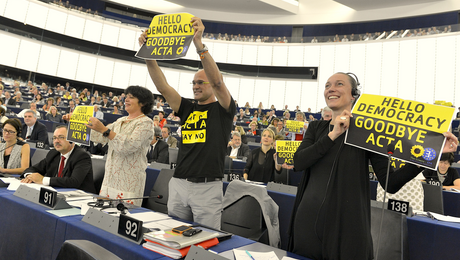
EU Observer | 18.12.2013
EU-US trade talks could become ’another Acta’
BY BENJAMIN FOX
BRUSSELS — EU-US free trade talks risk following the same path as Acta, the controversial anti-counterfeit treaty which collapsed in 2012.
The European Commission spent several years negotiating the Acta treaty, a multilateral agreement, on the EU’s behalf, but MEPs threw it out in July 2012, following public protests in a number of European capitals.
Its critics did not like the the potential reach of criminal sanctions or the policing role of Internet service providers.
But they focused their ire on the secrecy of the negotiations, with few documents being made public or released to national parliaments.
The EU executive has offered unprecedented access to documents on the EU-US trade deal, or TTIP, to interest groups and the European Parliament. It has also held meetings with member states’ officials to co-ordinate press coverage across the EU.
But for Monique Goyens, the director of Beuc, a pan-EU organisation representing consumer groups, it has not gone far enough.
"The Acta lesson has not been learned … the commission didn’t accept the reasons behind its failure," she told this website.
"There is a huge risk that this [TTIP] will go the same way," she added.
Goyens accepts that the EU executive is more forthcoming than on any previous trade negotiations.
But she says it is not enough: "There has been progress from a 0 percent starting point but we want 100 percent."
She noted that the commission is to set up a TTIP advisory committee representing business and consumer interest groups, expected to meet for the first time in mid-January. But she added that no one knows what the committee’s terms of reference will be.
"It is not clear whether this is just window-dressing," she said.
An EU official also confirmed that the composition and role of the committee has not been finalised.
Meanwhile, EU and US trade negotiators reconvene in Washington this week for the third round of`talks.
Negotiators are still at the stage of agreeing which topics will be on the table, but the commission believes that a final deal can be wrapped up by the end of 2014.
Both sides have emphasised the potential economic benefits of an agreement.
The commission predicts that a deal could be worth up to €119 billion for the EU economy, or an extra €545 per year to an average family of four.
But for Goyens the figures are misleading.
She warned that people "will feel cheated from overselling the economic benefits."
She also noted that the €545 per family figure is a projection for 2027 and that some individual sectors will suffer job losses, a possibility that is never mentioned in the Commission’s briefing material.
"There is a difference between reality and what comes out of DG Trade," she noted, referring to the commission department which handles TTIP, and which also handled Acta.
Her biggest beef is about the so-called investor state dispute resolution mechanism, however.
The system would allow foreign investors to bring a claim against an EU government or the US if they feel they are being denied fair treatment.
But critics say that investor claims can prevent governments from passing legislation and that arbitrations are carried out in secret by trade lawyers.
For its part, a commission document states that the system is needed to "provide guarantees to companies that their investments will be treated fairly and on an equal footing to national companies."
Goyens said "the main problem is that it is too easy for a company to sue a government."
She noted that the current TTIP text is "totally unacceptable and would be vetoed [by MEPs] for sure."
"The best solution would be to drop it [the investor claim clause] or, if you don’t drop it, then fundamentally change the conditions," she added.